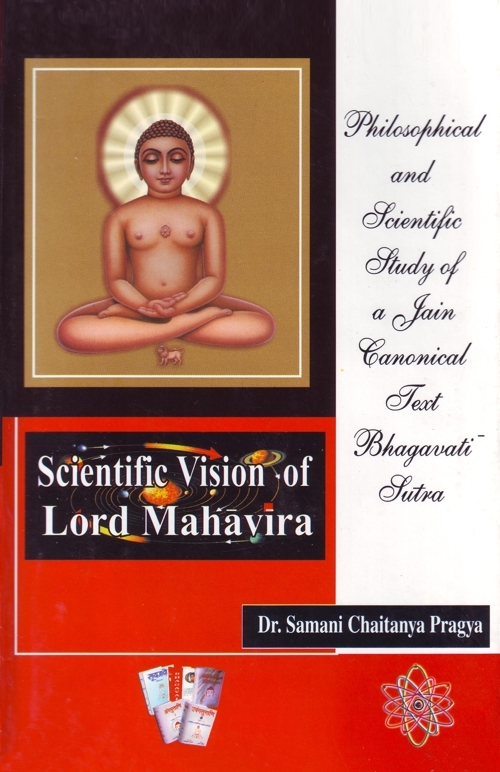The Bh.S presents a long list of the living beings divided on different bases. In short, they are of two forms—with developed bio-potential and without developed bio-potential or underdeveloped. Technically they are called 'paryāpta' and 'aparyāpta'.[47] Wether an organism born in a particular state of existence is developed or underdeveloped depends on the biopotentials. The development or underdevelopment of a being, thus, would depend on the complete or incomplete development of the corresponding bio-potential as indicated. The remarkable thing here is that the bio-potential is also required for livingness.
The concept of bio-energy (prāṇa) is seen in the early literature of the Indian thought but the concept of bio-potentials i.e. paryāpti is unique to the Jains. It is found in Bh.S.,[48] Jīvābhigama,[49] Ṣaṭkhaṇḍāgama and the like[50] which are the representative works of the Jain philosophy.
Bio-potential means the building up of material forces at the very beginning of rebirth.[51] The bio-potential is six-fold,[52] viz., aliment, body, sense-organ, inhaling- exhaling, speech and mind. The alimentary biopotential mean the production of material capacity for functioning as appropriation, transformation and elimination of alimentary matter.[53] The bio-potentials of body etc. also work in the same way. All the six biopotentials come into existence at the time of rebirth but the development of the alimentary bio-potential takes place in one instant and the rest within one muhūrta (48 minutes) gradually.[54]
In the words of Dr. N.L.Jain,[55] these six bio-potentials are nothing but a gradual development of the living in six stages: (i) embryo that takes food for building or running life. (ii) Food is that which causes the body to develop, which results in (iii) the development of physical senses depending on the class of the living. With the development of senses the development of (iv) respiration (v) speech and (vi) mind. According to Dhavalā, these bio-potential are the cause of corresponding different Vitalities.[56] It defines them as the formation or perfection of different organs or energetic aggregates of the body, which has been modified as the cause of such formations. Pujyapāda[57] and Akalaṅka[58] also support the definition. But later on, many authors presumed it to be an acquirement of energy for these formations. This seems to be a cause-effect formalization.
In regard to the Jain concepts of prāṇa and paryāpti, according to Dr. Nathamal Tatia, there are special considerations in the light of the modern conception of life as 'an energy, capable of organizing matter gathered from outside into the body of a living organism'.
In modern terms paryāpti means the power of "organization" of material from the environment into a special pattern. The fact becomes clear from the following passage:[60]
"All living things are 'organized', even, if, like a virus, they consist of little more than protein and nucleic acids............. This 'organization' is a highly improbable state for matter to be in. All inanimate matter—and dead matter are disordered and randomly scattered. A physicist knows this, as the tendency to increase 'entropy', for entropy is simply a measure of disorder. To counter this probable tendency energy is required, so living things can only retain their organized state of low entropy by respiration and the production of energy."
Dr. Nathmal Tatia further writes[61] that the Jain conception of prāṇa and paryāpti comes very near the modern idea of 'energy' mentioned in the above quotation. On the basis of Acharya Tulsi's aphorism[62]—"the bio-energy is prāṇa needed for paryāpti," he indicates that the bio-potentials are brought to their proper functioning by the power of prāṇa, in the absence of which they are incapable of attaining their maturity.
It is seen that these six bio-potentials correspond to ten of the bioenergies as shown below. The last one prāṇa i.e. life span is, according to Acharya Mahapragya,[63] is the consequence of the first bio-potential. Like the prāṇas, the lowest living ones have only four paryāptis in appearance.[64] Higher ones show all the six. In the case of godly life it is found that it has five bio-potentials, Vth and VIth bio-potentials taken as one.[65]
| Table 6: Paryāptis and Prāṇa | |
|---|---|
| Bio-potentials | Bio-energy |
| Aliment | 10 Life-span |
| Body | 7 Physical power |
| Sense-organs | 1-5 Sense of taste Sense of smell Sense of sight Sense of hearing Sense of touch |
| Inhaling and exhaling | 8 Respiration |
| Speech | 7 Vocal power |
| Mind | 6 Mental power |
Bio-potential, in the view of Dr.N.L.Jain,[66] are of rather physical nature than supra sensual as Akalaṅka[67] has pointed out because their names represent the formation of various organs to perform different functions—internal and external. For example, the respiratory bio-potential, according to him, should mean development of nasal-organ, heart and nervous systems. Any system requires energy, normally supplied by food intake during its digestion and metabolic transformation for working. In absence of a respiratory system, the above processes will become difficult. Even the development of various systems will not be possible. Actually, the inhaling and exhaling is perceptible in all normal and special cases. In a sense, they seem to be grosser than vitalities. The physico-chemical or physiological processes occurring in various organs are known to generate energy to give power and energy. Hence, bio-potentials are primary physical processes of developing a body and its various organs and supplying the necessary caloric energy or force for different bio-energies to grow and function. He further writes[68] that this view is in conformity with the causeeffect relationship between the two. This view will support Sikdar's suggestion of protoplasmic (enzymic or nucleic acidic) nature of biopotentials though this critical analysis could not be assumed during the canonical and pre-canonical periods. However one can realize that the Jain thinkers were keen observers of physical and functional aspects of the living.
(ii) Mūlācāra; 1045 - āhāre ya sarire taha indiya āṇapāṇa bhāsāe / honti maṇo vi ya kamaso pajjatti jiṇakkhādā //
 Dr. Samani Chaitanya Pragya
Dr. Samani Chaitanya Pragya

